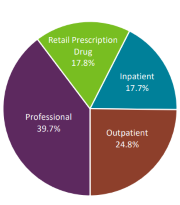Health Economics Program
Annual Work
- Chartbooks
- Health Access Survey
- Minnesota All Payer Claims Database (MN APCD)
- Health Care Quality Measures
- Rx Price Transparency
Special Projects
- Implementation Updates
- Hospital Bed Moratorium
- Market Oversight
- Statewide Health Care Needs and Capacity Report
- Universal Health Care Finance System
- Utilization Review Organization Reporting
Email Subscription
Last Updated: 02/26/2026



